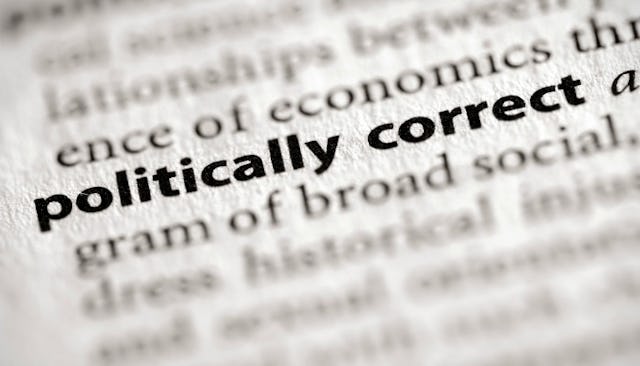Why I'm Teaching My Kids To Be 'Politically Correct'

Wherever you fall on the political spectrum, the term “politically correct” is a loaded one. Over the decades, those two words have been bandied about positively and pejoratively, and almost always strategically. They have changed meanings and connotations countless times, to the point where their definition depends on the exact year in which they are being used. Most recently, the phrase has been revived as a kind of schoolyard insult: “Oh, you’re so politically correct” is the new equivalent of “You spineless little sissy.”
But I don’t consider being “politically correct” to be a weakness, or even a negative at all, most of the time. The idea that terminology can be hurtful, that names and labels make a difference, that choosing unifying words is a worthy goal has been with me since childhood. Words have power whether we want them to or not. A short glance through history shows us how rhetoric and propaganda—nothing but words—have fueled the most heinous, inhuman acts the world has ever seen. Simply put, language matters.
As a writer, I think constantly about how words are being used, and from where I’m sitting, political correctness has gotten conflated in recent years with common decency, kindness, and consideration. On one hand, anyone who dares to acknowledge people who say they’ve been hurt, or who suggests that demonizing an entire group of people is a bad idea, is automatically derided for being “politically correct.” And on the other hand, people will say any awful thing that floats into their mind, claiming that they are “just being honest,” and then when challenged, they will cry about political correctness. (For the record, speaking your mind isn’t a virtue if what’s on your mind is bigoted, obnoxious, or insulting. It’s just rude.)
The war on political correctness has become a scapegoat for people to regress to a less open and tolerant era, as evidenced by the amount of blatant racism, sexism, prejudice, and hatred being spewed in the name of not being PC. The idea that marginalized or historically oppressed groups should be given any kind of consideration is met with eye-rolling and open disdain. In the past year, I’ve been stunned to witness educated adults behaving like petulant children, gleefully claiming they’re taking down “the establishment” by throwing out the baby of human decency with the “politically correct” bathwater.
I don’t know if they are unable to distinguish the two or if they don’t care, but either way, I’m done watching that baby go sailing. If being “politically correct” means not being a brash, overbearing, disrespectful jerk, then by all means, that’s what I want to be—and it’s what I want my kids to be too.
Of course, we have to step back and look past our momentary social and political climate to decide whether “politically correct” is really an ideal to shoot for. According to Merriam-Webster, the simple definition of “politically correct” is “agreeing with the idea that people should be careful to not use language or behave in a way that could offend a particular group of people.” Hmmm. Choosing our words and actions carefully. Making an effort not to cause offense to entire groups of people. That sounds remarkably civilized to me. I’m teaching my kids that their words and actions have an impact and that they can use them to contribute to peace and goodwill between diverse people or to make the world more divided.
Are some people too easily offended? Sure. Can we always be sure that our language and behaviors don’t offend someone? Of course not. But that doesn’t mean we shouldn’t try. We can’t just toss our hands up and quit trying to be thoughtful and considerate because some people won’t appreciate our effort. What kind of message is that to send our kids?
Any ideology can be taken to an extreme, and there are times that political correctness can make things difficult—but not nearly as difficult as tossing common courtesy and consideration out the window. I want my kids to know that language and behavior matters, that thoughtfulness and respect are important, and that dismissing those things by labeling them “politically correct” is a fool’s game.
I refuse to live in a world where decency and discernment are seen as weaknesses, and belligerence and bigotry are considered strengths. I refuse to live in a world where taking potshots at people’s appearances and stereotyping groups of people are celebrated, while diplomacy and attempts at bridge-building are scorned. If that’s what the war on political correctness looks like, I know which side my family is on. I’ll take being PC over being an insensitive a-hole any day—and I’ll proudly teach my kids to do the same.
This article was originally published on